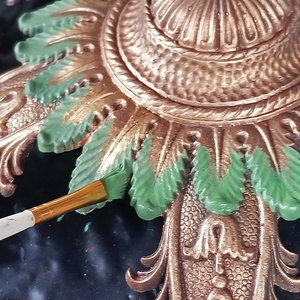On a recent bathroom remodel I was having a cultured marble shower intalled. The installers were using a rag soaked in denatured alcohol to tool and clean up silicone caulk joints. The results looked great but I wondered what this did to the integrity of the silicone. They said they did it all the time. I’ve heard that before. Has anybody heard if this is OK.
Discussion Forum
Discussion Forum
Up Next
Video Shorts
Featured Story

Dangerous electrical work and widespread misconceptions cause fires, deaths, and $1.5 billion in property damage annually.
Featured Video
How to Install Exterior Window TrimHighlights
"I have learned so much thanks to the searchable articles on the FHB website. I can confidently say that I expect to be a life-long subscriber." - M.K.
Fine Homebuilding Magazine
- Home Group
- Antique Trader
- Arts & Crafts Homes
- Bank Note Reporter
- Cabin Life
- Cuisine at Home
- Fine Gardening
- Fine Woodworking
- Green Building Advisor
- Garden Gate
- Horticulture
- Keep Craft Alive
- Log Home Living
- Military Trader/Vehicles
- Numismatic News
- Numismaster
- Old Cars Weekly
- Old House Journal
- Period Homes
- Popular Woodworking
- Script
- ShopNotes
- Sports Collectors Digest
- Threads
- Timber Home Living
- Traditional Building
- Woodsmith
- World Coin News
- Writer's Digest


















Replies
I've never had a problem, but chemistry isn't my strong point.
I usually use denatured alcohol that is cut 50/50 with water, but I've used it straight with no problems. I cut it down to help with the stink.
I wish I had a reason;
my flaws are open season
shims,
there are different formulations of silicones. in some cases alcohol
can impede the cure. Manufacturers generally recommend dry tooling.
(no solvents, water etc). Use masking tape on both sides, run the
bead and tool with a spatula and pull the tape. Again, it depends on
the silicone. If there was a problem you would have seen it
by now with the sealant still being tacky or not setting up at all.
always good to pull a data sheet and see what is recommended.
Mclaren
No problem. Latest, greatest solution. Did you ever have a Gilbert chemistry set as a kid? Younger than fifty, probably not. No safety rules then, but you found that denatured alcohol burned clean and would kill you if you drank it, as many winos did. Also called wood alcohol. My dad got it for me when he was at the co-op buying arsenic for the barn rats -- I guess we weren't as smart as current do-gooders are now. Anyway, it has no water content, so it's volatile enough to do the job yet not leave fumes as harmful as those of MEK or other, stronger solvents.
Wood alcohol is methanol. If I remember correctly, besides killing you, it can also blind you.Denatured alcohol is ethanol (grain alcohol) with something added to it to make it unsafe to drink, so that people won't drink it. The additive can be methanol but doesn't have to be. According to wikipedia, "Typical additives are methanol, isopropanol, methyl ethyl ketone, methyl isobutyl ketone, denatonium, and even (uncommonly) aviation gasoline."Methanol is a traditional additive because it's very difficult to remove it....
"It is also common to add a vomiting (emetic) agent, which serves a similar purpose without the fatal side-effects. Likewise, denatonium adds a bitter taste but will not kill."Because of the impurities, denatured alcohol is not typically used as a reagent in chemistry class -- in college, if someone could "score" some reagent grade alcohol from the chemistry lab to add to the punch at a dormitory or fraternity party, the party was generally considered a success...Rebeccah
Tell meore - What is they take out or nullify when they DE-nature it? Or to put it another way, what is it's nature before it gets de-natured?
Welcome to the Taunton University of Knowledge FHB Campus at Breaktime. where ... Excellence is its own reward!
It is just plain ethanol (concentrated drinking alchohol), with an additive rendering unfit for human consumption (poisonous), hence there is no federal/state alchohol tax on it. Tax avoidance is the only reason it is denatured.
It's nature is that it is pleasurable and intoxicating to drink, livens up parties by relaxing inhibitions, is addictive, and facililtates other "vices".That is the nature that is removed by making it poisonous (and/or bad tasting and/or nauseating and/or a weird color) so that normal people (who aren't already addicted and desperate) won't drink it.Rebeccah
You're right on!
The denatured doesn't bother me about this. It is the fact they are using silicone that made me raise an eyebrow. It would have too be a silicone product especially formulated for Marble. Most silicones have an acid transfer agent that is harnmful to stone and masonry in general and especially so with marble, which is only a compresssed limestone, a strong base that reacts with acid. I have never seen a silicone bead stay adhered to any masonry for long.
Welcome to the
Taunton University of Knowledge FHB Campus at Breaktime.
where ...
Excellence is its own reward!
He said "cultured marble" which is essentially cast plastic. You know, the stuff many if not most vanity sink tops are made of. Silicone is fine for this application, the only down side is that it may need to be replaced every several years due to mold/mildew.
Thanks. My eye missed cultured and went straight to marble
Welcome to the Taunton University of Knowledge FHB Campus at Breaktime. where ... Excellence is its own reward!
Well, they could've used saliva instead. For my money, I'd go with the ethanol ;-)
Been there done that I am now a confirmed denatured alcoholic
I'm surprised GE hasn't developed a "synthetic spit" to go with their silicone caulks. Perhaps the chemistry of saliva is still too exotic, even in the 21st century :D
We here have discussed using the denatured alcohol to tool silicone before. I wondered the same thing you did, but no one was able to come up with any actual negative effect of doing it that way. I had a situation where I thought the alcohol had caused a problem, but it turned out that the silicone caulk was bad due to being stored in a hot place (my truck). It was GE silicone II. Once I got a fresh tube, everything was fine. And BTW - the project that I was working with was the same as yours - cultured marble shower. One thing I did learn from that conversation here at BT, is that denatured alcohol can be absorbed into one's skin if you don't wear gloves when handling it. Like a previous poster said though, after it is applied, it evaporates so fast, really, nothing is left.
Thanks for all the great info, I guess you're never too old to learn
new tricks.
I've worked with several siliconized acrylic caulkings and tested dozens of different cleaners. Water, ketones and alcohols by themselves or diluted do not seem to have any affect on the crosslinking of the polimers or weatherability (yellowing, chaulking or cracking). Stay away from terpenes and d-limonene (citrus by-product) as they have been shown to inhibit cure and will cause yellowing.